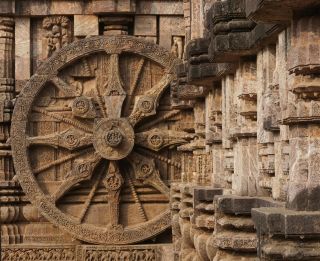Wisdom
The Buddha's Solution to Suffering
Learn the Middle Way, Four Noble Truths, and Eightfold Path.
Updated May 5, 2024 Reviewed by Ray Parker
Key points
- The Buddha was struck by human suffering and spent years trying to understand it.
- The cause of all suffering, he said, is desire.
- And the way to eliminate all suffering is the Eightfold Path.

Last time, I discussed the life of the Buddha. The Buddha was struck by human suffering and spent years trying to understand its causes and the means to overcome them.
After reaching enlightenment, the Buddha delivered his first sermon in the deer park at Sarnath, on the outskirts of Kashi (modern-day Varanasi). He preached the Middle Way between luxury and austerity, the Four Noble Truths, and the Eightfold Path.
The Middle Way and Dependent Origination
Two early insights that led the Buddha to enlightenment are the Middle Way and Dependent Origination. According to the doctrine of the Middle Way, we are more likely to achieve insight and wisdom if we avoid extremes of self-gratification and self-mortification—in his case, as a prince and, later, as a mendicant.
According to the doctrine of Dependent Origination, or Interdependent Arising, life is a continuous process of change, and every instance of change has manifold causes and effects. This means that all things are conditioned by other things, so that all things are interconnected.
Suffering arises from a craving for permanence; but all permanence is an illusion that, in time, can only lead to pain and disappointment.
Although nothing exists permanently, it is equally wrong to say that nothing exists at all. This, too, is a middle way.
Does the self exist? In one sense, it does; in another, it does not—which is why, when asked the question, the Buddha, as was his way, simply remained silent.
The Four Noble Truths
If all things are conditional and subject to change, then so too is suffering.
It is said that, upon enlightenment, the Buddha understood the Four Noble Truths—more accurately translated as the “four truths for the noble of spirit”:
- Suffering (dukkha) is inherent in all life.
- The cause of all suffering is desire.
- There is a natural way to eliminate all suffering.
- The Noble Eightfold Path is that way.
The first truth, dukka, acknowledges the unsatisfactory nature of existence. The second truth, samudaya (origin), attributes a cause to this suffering. The third truth, nirodha (cessation), posits a state comparable to the Greek ataraxia (tranquillity) that is free from suffering. And the fourth truth, marga (path), points to the method for achieving that state.
Although translated as “suffering,” dukka refers more broadly to the inherently impermanent and unsatisfactory nature of all things, including the pleasant ones—for it is on account of them that we suffer most.
Nirodha is also referred to as nibbana (“blown out”, “extinguished”, as in a candle) in Pali or nirvana in Sanskrit, indicating that, rather than a positive state, nirvana is more of a negative state of absence of desire. Nirvana is the state of wishing for nothing, not even Nirvana.
If the cause of dukka is desire, the cause of desire is ignorance, pointing to knowledge or wisdom as the way forward. With proper perspective, there would be no desire, and so no suffering—and no (re)birth, which is the fruit of desire, and the source of all suffering.
Does this mean that people should not have children? No, insofar as being born is an opportunity to escape being born. The purpose of life is to provide us with an opportunity to escape it, by achieving wisdom. Otherwise, “we” shall have to try again.
The Eightfold Path
Unfortunately, wisdom is hard to attain because it runs counter to everything we have learned and everything we love, including the things we love most ourselves. On top of that, it skirts with everything we fear, not least death and impermanence. For these reasons and more, it takes long practice and training to attain wisdom, and even longer practice and training to hold on to it in the face of temptation, fragility, and adversity.
But even if we are unable to commit to becoming a monk or nun, we can still embark on the Noble Eightfold Path:
- Right view (maintaining perspective on reality)
- Right intention or resolve (renouncing the worldly life for the life of wisdom)
- Right speech (e.g. no lies, slanders, or idle talk)
- Right action or conduct (e.g. no killing, stealing, or sexual misconduct)
- Right livelihood (earning a living through a profession that does not visit harm to others)
- Right effort (preventing unwholesome mental states, and encouraging wholesome, productive ones)
- Right mindfulness (paying due attention to thoughts, feelings, sensations, and external phenomena)
- Right concentration or meditation (cultivating the highest states of mind)
The eight categories are overlapping and mutually reinforcing, and to be worked on simultaneously rather than successively. Indeed, the Noble Eightfold Path is often represented by a dharma wheel, or dharmachakra, with eight spokes, none of which is either first or last.
The dharmachakra can also stand for dependent origination, change, and the cycle of rebirth (samsara), all in one. It is said that, with his first sermon, the Buddha set the wheel of dharma ("law", "rightfulness") into motion.
With desire under control, everything becomes a lot better, and a lot easier. In an absence of desire, why lie or steal, or be envious or greedy? Or why be anxious, or angry, or depressed? The opposite of envy is not merely an absence of envy but shared joy and admiration. The opposite of greed is not merely an absence of greed, but decency and generosity. The opposite of anger is not merely an absence of anger but compassion. The opposite of anxiety is not merely an absence of anxiety but tranquillity. The opposite of depression is not merely an absence of depression, but wisdom.
Neel Burton is author of Indian Mythology and Philosophy.




